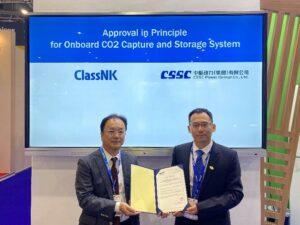07 September 2023 – ClassNK has issued an Approval in Principle (AiP) for an onboard CO2 capture and storage (OCCS) system developed by China Shipbuilding Power Engineering Institute Co., Ltd. (CSPI), a member of CSSC Power (Group) Co. Ltd. (CPGC).

Right: Mr. Dai Qun, Deputy Section Chief / Senior Engineer, CPGC
Left: Mr. Hayato Suga, Executive Vice President, ClassNK
In addition to fuel transition, interest in capturing CO2 from ships’ exhaust gas is growing as a way to reduce GHG emissions, and the development of onboard systems for capturing and storing CO2 is being undertaken. To encourage the development of the related technology, ClassNK has published “Guidelines for Shipboard CO2 Capture and Storage Systems” including safety requirements for the systems and their installation on the ships. For a design concept of the system developed by CSPI, ClassNK conducted a review based on Part D (Machinery) of its “Rules and Guidance for the Survey and Construction of Steel Ships” and “Guidelines for Shipboard CO2 Capture and Storage Systems”. Having verified the system drawings, risk assessment results, etc., ClassNK issued the AiP upon confirming compliance with the prescribed requirements. Dai Qun, Deputy Section Chief / Senior Engineer, CPGC said, “The current global shipping decarbonization goal is accelerating, and CPGC is actively responding to the trend by developing OCCS, which has high efficiency, high integration, and low energy consumption. The AiP of OCCS issued by ClassNK for CPGC, will provide assistance for us to achieve the transformation and development of green and low-carbon ship power.” Masaki Matsunaga, Corporate Officer / Director of Plan Approval and Technical Solution Division, ClassNK said, “Onboard CO2 capture is one of the potential solutions for pursuing decarbonization, along with the transition to alternative fuels. We are pleased to issue the AiP for the forward-looking design concept of the system developed by CSPI. ClassNK remains committed to supporting the realization of innovative solutions for the decarbonization of shipping.”
Approval in Principle (AiP):At the initial stage of designing or before the specific target ship to be implemented is decided, the design is examined based on the existing regulations such as international conventions and ship classification rules, and an Approval in Principle (AiP) is issued as proof of conformity with requirements. It also prevents rework of regulatory aspects in the post-process, shortens the examination time at the time of class registration, and can be used as a technical basis for external appeal of the design status. For more information, visit our website
